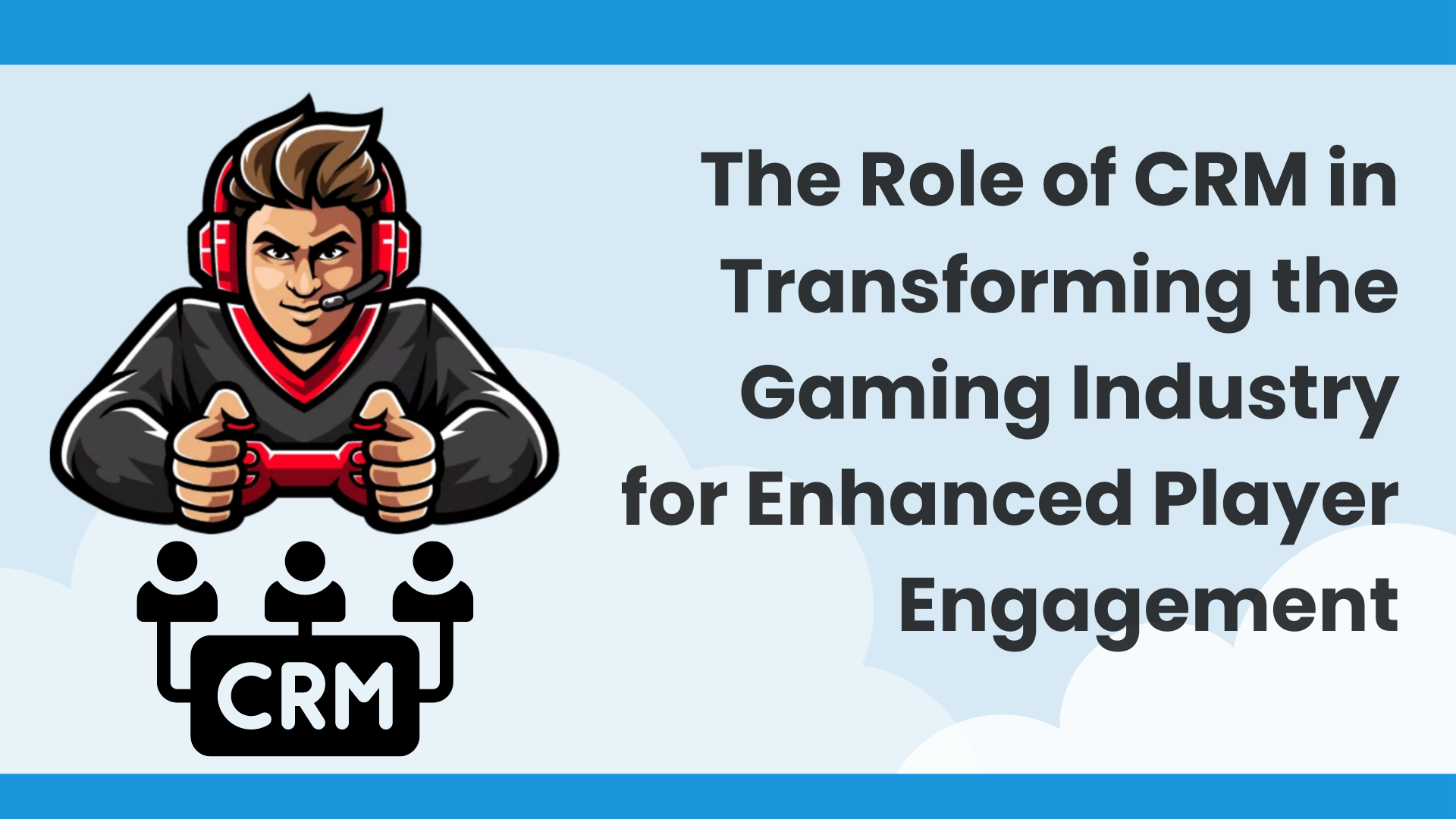The gaming industry is a dynamic and rapidly evolving sector, constantly pushing the boundaries of technology and creativity to deliver unparalleled experiences to players worldwide. As competition intensifies and player expectations soar, gaming companies are increasingly turning to Customer Relationship Management (CRM) systems to enhance player engagement and build lasting relationships. In this blog, we will explore how CRM is transforming the gaming industry, driving player engagement, and fostering loyalty.
Understanding CRM in the Gaming Industry
Customer Relationship Management (CRM) is a strategic approach that leverages technology to manage and analyze customer interactions and data throughout the customer lifecycle. In the gaming industry, CRM systems are designed to track player behavior, preferences, and feedback to create personalized gaming experiences. By utilizing CRM, gaming companies can gain valuable insights into player needs and preferences, enabling them to tailor their offerings and communication strategies accordingly.
The Importance of Player Engagement
Player engagement is the cornerstone of success in the gaming industry. Engaged players are more likely to spend time and money on games, participate in community activities, and promote the game to others. High levels of engagement also contribute to player retention, reducing churn rates and ensuring a steady stream of revenue. CRM systems play a crucial role in enhancing player engagement by providing a 360-degree view of the player, allowing gaming companies to deliver personalized and relevant experiences.
Key CRM Features Transforming the Gaming Industry
1. Personalized Marketing Campaigns
CRM systems enable gaming companies to segment their player base and create targeted marketing campaigns. By analyzing player data, companies can identify specific player segments and tailor their marketing messages to resonate with each group. For example, a CRM system can help identify players who frequently purchase in-game items and send them personalized offers and promotions, encouraging further spending and engagement.
2. Behavioral Analytics
Understanding player behavior is essential for creating engaging gaming experiences. CRM systems provide robust analytics tools that track player actions, such as in-game purchases, playtime, and social interactions. This data can be used to identify patterns and trends, helping gaming companies to optimize game design, introduce new features, and create content that resonates with players.
3. Enhanced Customer Support
Effective customer support is vital for maintaining player satisfaction and loyalty. CRM systems streamline customer support processes by centralizing player data and interactions. Support agents can access comprehensive player profiles, including past interactions and purchase history, enabling them to provide personalized and efficient support. Additionally, CRM systems can automate support processes, such as ticketing and issue resolution, reducing response times and improving the overall player experience.
4. Loyalty Programs and Rewards
Loyalty programs are an effective way to incentivize player engagement and retention. CRM systems can help design and manage loyalty programs by tracking player activities and rewarding them with points, badges, or exclusive in-game items. By offering meaningful rewards, gaming companies can encourage players to stay engaged and continue playing, fostering long-term loyalty.
5. Community Building
Building a strong player community is essential for creating a thriving gaming ecosystem. CRM systems facilitate community building by enabling gaming companies to engage with players through various channels, such as social media, forums, and in-game chat. By fostering a sense of community and encouraging player interaction, gaming companies can create a loyal and passionate player base.
Case Studies: CRM Success in the Gaming Industry
Case Study 1: Electronic Arts (EA)
Electronic Arts (EA), a leading gaming company, leveraged CRM to enhance player engagement and drive growth. By implementing a CRM system, EA was able to track player behavior and preferences across multiple games and platforms. This data allowed EA to create personalized marketing campaigns, improve customer support, and introduce loyalty programs that rewarded players for their engagement. As a result, EA saw increased player retention, higher in-game spending, and a more engaged player community.
Case Study 2: Blizzard Entertainment
Blizzard Entertainment, known for its popular games like World of Warcraft and Overwatch, used CRM to gain deeper insights into player behavior and preferences. By analyzing player data, Blizzard identified key trends and preferences, allowing them to create targeted marketing campaigns and introduce new features that resonated with players. The CRM system also helped Blizzard improve customer support, leading to higher player satisfaction and loyalty.
Future Trends: The Evolution of CRM in Gaming
As the gaming industry continues to evolve, CRM systems will play an increasingly important role in driving player engagement and loyalty. Here are some future trends to watch:
1. Integration with Artificial Intelligence (AI)
AI-powered CRM systems will enable gaming companies to analyze player data more effectively and create highly personalized experiences. AI can help predict player behavior, recommend in-game purchases, and optimize marketing campaigns, leading to increased engagement and revenue.
2. Omnichannel Engagement
Players interact with games through multiple channels, including mobile devices, consoles, and social media. Future CRM systems will enable seamless omnichannel engagement, allowing gaming companies to provide a consistent and personalized experience across all touchpoints.
3. Gamification of CRM
Gamification involves incorporating game-like elements into non-gaming contexts to enhance engagement. Future CRM systems may incorporate gamification features, such as leaderboards, challenges, and rewards, to incentivize player engagement and loyalty.
Conclusion
CRM systems are revolutionizing the gaming industry by providing valuable insights into player behavior and preferences, enabling personalized marketing, enhancing customer support, and fostering community building. As the industry continues to grow and evolve, CRM will play a crucial role in driving player engagement and loyalty. Gaming companies that embrace CRM technology will be better positioned to meet player expectations, create compelling gaming experiences, and achieve long-term success.
At CETDIGIT, we understand the transformative power of CRM in the gaming industry. Our expertise in CRM solutions can help gaming companies leverage the full potential of their player data, enhance engagement, and drive growth. Partner with us to unlock the future of gaming through innovative CRM strategies.
CRM Revolutionizes the Gaming Industry

Popular Post
- Nostalgia Marketing’s Power with Millennials & Gen Z
- SaaS Founder's Bible: The Rise, Fall, and Future of SaaS (2020-2025)- Part 1: Navigating Market Shifts
- Sales and Sales Development in 2024: Why AI is a Must-Have for Growth
- What is Salesforce CRM?
- CETDIGIT's Innovative Approach to Salesforce & HubSpot CRM Implementation
Subscribe
Similar Blogs

Top 5 CRM Integration Principles
CRM integration, meaning the process of connecting your CRM software with other applications to...
READ MORE
How AI Transforms HubSpot CRM: Unlocking Growth with Intelligent Tools
Picture a CRM system that’s role doesn’t just function as a storage unit for information—but...
READ MORE
Evaluating the Top 5 CRM Tools for 2024: A comprehensive Guide
Customer relationship management. CRM. Whether it’s a phenomenon that you’ve recently stumbled...
READ MORE
Leave a Comment